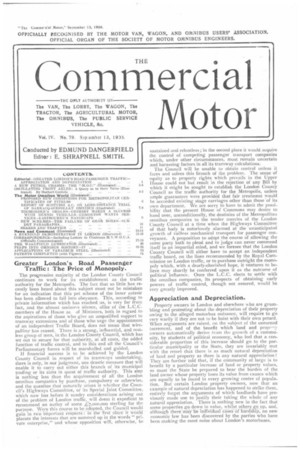Greater London's Road Passenger Traffic : The Price of Monopoly.
Page 1

If you've noticed an error in this article please click here to report it so we can fix it.
The progressive majority of the London County Council continues to work for its establishment as the traffic authority for the Metropolis. The fact that so little has recently been heard about this subject must not be mistaken for an indication that this pet scheme of the inner coterie has been allowed to fall into abeyance. This, according to private information which has reached us, is very far from fact, and the almost ominceis silence, alike of the L.C.C. members of the House ar. of Ministers, both in regard to the aspirations of those who give an unqualified support to tramway extensions and of those who urge the appointment of an independent Traffic Board, does not mean that wirepullinghas ceased. There is a strong, influential, and restless group of men, in the London County Council, which has set out to secure for that authority, at all costs, the added function of traffic control, and to this end all the Council's Parliamentary forces will be marshalled and guided. If financial success is to be achieved by the London County Council in respect of its tramways undertaking, there is only, in our judgment, one drastic measure that will enable it to carry out either this branch of its municipal trading or its aims in quest of traffic authority. This step is nothing less than the acquirement of all the London omnibus companies by purchase, compulsory or otherwise, and the question that naturally arises is whether the Council's Highways Committee, or its Special Joint Committee, which now has before it sundry considerations arising out of the problem of London traffic, will deem it expedient to recommend an outlay of some £7,000,000 sterling for the purpqse. Were this course to be adopted, the Council would gain in two important respects : in the first place it woUld placate the interests that are summed up in the words " private enterprise," and whose opposition will, otherwise, be
sustained and relentless ; in the second place it would acquire the control of competing passenger transport companies which, under other circumstances, must remain uncertain and harassing factors in all its tramway calculations.
The Council will be unable to obtain control unless it faces and solves this Branch of the problem. The sense of equity as to property rights which prevails in the Upper house could not but result in the rejection of any Bill by which it might be sought to establish the London County Council as the traffic authority for the Metropolis, unless ample guarantees were provided that fair treatment would be accorded existing stage carriages other than those ofits own department. We are sorry to have to admit the possibility that the present House of Commons may desire to hand over, unconditionally, the destinies of the Metropolitan omnibus companies to the tender mercies of the London County Council at a time when the Highways Committee of that body is notoriously alarmed at the unanticipated growth of railless mechanical transport for passenger conveyance. A proposition to adopt the course of allowing the same party both to plead and to judge can never commend itself to an impartial mind, and we foresee that the London County Council will either have to accept an independent traffic board, on the lines recommended by the Royal Commission on London traffic, or to purchase outright the monopoly which, with a dearly-cherished hope, it ventures to believe may shortly be conferred upon it as the outcome of political influence. Once the L.C.C. elects to settle with the omnibus companies, its prospects of obtaining early powers of traffic control, though not assured, would be very greatly improved.
Appreciation and Depreciation.
Property owners in London and elsewhere who are grumbling and protesting about the depreciation of their property owing to the alleged motorbus nuisance, will require to go very warily if they are not to be hoist with their own petard. When arguments are raised, on the subject of the unearned increment, and of the benefit which land and prope-iy owners automatically derive train the growth of a community, by students of political economy, who feel that a considerable proportion of this increase should go to the particular municipality or the State, they are invariably met with the retort that there is as much natural depreciation of land and property as there is any natural appreciation ! They are further told that, if the community at large is to benefit by a particular increase of land or property values, so must the State be prepared to bear the burden of the land owner whose property loses its value from causes which are equally to be found in every growing centre of population. But certain London property owners, now that an example of natural depreciation has happened to strike them, entirely forget the arguments of which landlords have previously made use to justify their taking the whole of any natural appreciation. There is nothing new in the fact that some properties go down in value, whilst others go up, and, althougb there May-lie individual cases of hard-ship, no new economic law has been discovered by the parties who have been making the most noise about London's motorbuses.


























